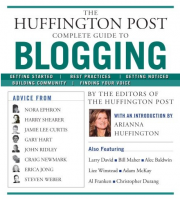
<!–
–>
It’s an occasion when Paul Ford publishes one of his abstract, funny, pleasingly resistant to the understanding, often absurdist yet somehow clear-eyed essays on the sketchy corner where technology and media intersect. He’s one of the rare media writers for whom it’s worth putting everything down and finding his stuff, which will most likely appear on his blog, FTrain. It’s been almost a year since he caused a stir with “Real Editors Ship,” a piece that needs no explanation … or rather, it does, a good thing in today’s calculating media environment because it means that Mr. Ford does not bend his headlines to the demands of search engine optimization.
Mr. Ford, a former Harper’s editor, actually ditches most of the kind of guidelines you’d see in, say, “The Huffington Post Complete Guide to Blogging,” a book I’ll just presume you’ve read.
His approach requires you to read past the headline to get the gist, and once you get the gist you probably have to read it again for something approaching a full understanding. Multiple readings, you shriek? What is this? College? No, it’s not, though someone on Twitter did compare the moment of discovering Mr. Ford to first reading Nietzsche in high school.
Mr. Ford’s most recent post, “Woods+,” is about both Google’s new social network and Mark Zuckerberg’s recently disclosed recruitment strategy, which involves a walk in the woods. This is the opening paragraph:
I know it’s confusing. But this is their competitor to Facebook basically. Except you can list your friends. That’s the circles. But it’s easier to remember if you call them holes. Like I could have a friend hole and an acquaintance hole and a K-hole. And they give you a list of friends and you stuff them in the hole, like Silence of the Lambs, except you are sending them images and text messages and hanging out with them on video chats. One of the things that can happen, according to the press, is that you can, if you are very lucky, talk with one of the founders of Google, because he’s hanging out using the service too. And you can ask him about user experience, and show him your cat. Which sounds horrifying, like having to pee next to Steve Jobs or playing touch football with Arnold Schwarzenegger. People rich enough to place phone calls to order body organs, people who can afford to hide families, make me nervous. The only thing they could want me for is harvesting.
I once had journalist Janet Malcolm’s famous quote, the one about journalism being “morally reprehensible,” on a business card. That was most certainly a mistake from the point of view of source development and trust-building, but was also symptomatic of my uncritical reading of Ms. Malcolm’s interrogation of the profile-writing business unfurled so beautifully and concisely in “The Journalist and the Murderer.” The book tops most lists of great books about journalism, which suggests I’m not the only one to be enraptured by her all-too-eloquent brand of professional self-loathing. (It occurs to me now that liking things like Janet Malcolm is an adult version of dying your hair pink in high school. Happily, it washes out.) In any event, Esquire’s Tom Junod, who remains quite unenraptured, unloaded on The New Yorker writer this week, writing in a post-News of the World world, a place where the notion of truly reprehensible journalism is no longer a metaphor:
I will argue, however, that the journalistic internalization of Janet Malcolm as “journalistic conscience” constitutes a scandal in its own right, if only because for all the undeniable power of her rhetoric and “the nice sting” of her one-liners (she is the Henny Youngman of self-hating journalists), she’s utterly full of shit. Worse, Janet Malcolm is both self-serving and self-descriptive; in her most recent book she writes that “malice remains [journalism’s] animating impulse,” when it’s clear to anyone who reads her work that very few journalists are more animated by malice than Janet Malcolm.
What better escort into your summer weekend than a long piece by on NPR’s website about how the internet changed rave culture? Zine publisher Matt Massive tells Michaelangelo Matos about a 1993 plot to rob a Kinko’s in Wisconsin of its PCs so that he could upgrade the zine’s internet presence:
Among the co-schemers: a group of hard-drinking skinheads collectively nicknamed the Pukers. “They weren’t SHARPS [Skinheads Against Racial Prejudice] and they weren’t really racists anymore,” Massive says. “They just really liked being thugs. They really brought a raucous element. We were afraid of them. They’d show up in combat boots. They’d get kicked out [of parties] every night for slam dancing.”
To prepare for the robbery, the Pukers “watched Goodfellas for almost 24 hours straight,” says Massive. “They didn’t get any sleep. They just kept watching Goodfellas over and over and over again to get themselves psyched up for this heist.”
Two more standout readings this week:
Using, mainly, the internet, The N.Y. Observer’s Aaron Gell tracked down a CIA official who had been hunting Osama Bin Laden for years. Despite not revealing the identity or whereabouts of the official, it’s a fascinating tale of journalistic process and the impact of social media on governmental secret-keeping.
Finally, ProPublica’s Richard Tofel asked the family that sold Dow Jones to News Corp. if, given some recent events, they have any regrets. Guess what? They do!
Article source: http://adage.com/article/mediaworks/willful-seo-aversion-reprehensible-journalism/228749
